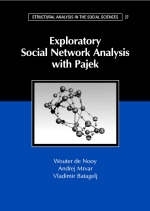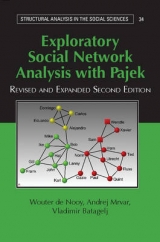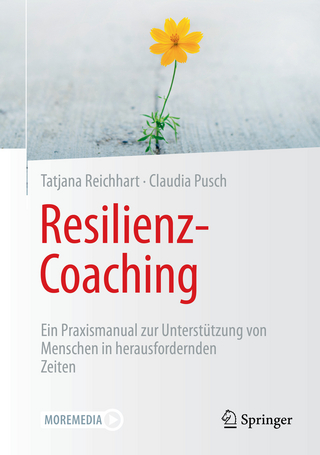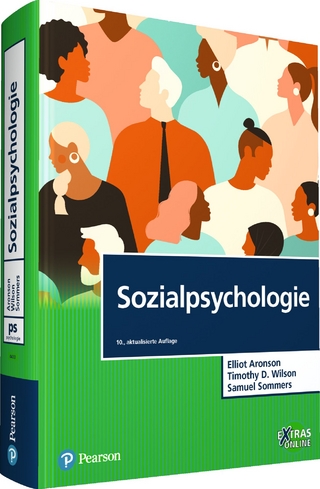
Exploratory Social Network Analysis with Pajek
Cambridge University Press (Verlag)
978-0-521-60262-4 (ISBN)
- Titel erscheint in neuer Auflage
- Artikel merken
This was the first textbook on social network analysis integrating theory, applications, and professional software for performing network analysis (Pajek). Step by step, the book introduces the main structural concepts and their applications in social research with exercises to test the understanding. An application section explaining how to perform the network analyses with Pajek software follows each theoretical section. Pajek software and datasets for all examples are freely available, so the reader can learn network analysis by doing it. In addition, each chapter offers case studies for practising network analysis. In the end, the reader has the knowledge, skills, and tools to apply social network analysis in all social sciences, ranging from anthropology and sociology to business administration and history.
Professor Wouter De Nooy specializes in social network analysis and applications of network analysis to the fields of literature, the visual arts, music and arts policy. His international publications have appeared in Poetics and Social Networks. He is lecturer in methodology and sociology of the arts, Department of History and Arts Studies, Erasmus University, Rotterdam. Professor Andrej Mrvar is assistant Professor of Social Science Informatics at the University of Ljubljana, Slovenia. He has won several awards for Graph Drawings for competitions between 1995 - 2000. He has edited Metodoloski zvezki since 2000. Professor Vladimir Batagelj is professor of Discrete and Computational Mathematics at the University of Ljubljana, Slovenia. Member of editorial boards of Informatica and Journal of Social Structure. He has authored several papers in Communications of ACM, Psychometrika, Journal of Classification, Social Networks, Discrete Mathematics, Algorithmica, Journal of Mathematical Sociology, Quality and Quantity, Informatica, Lecture Notes in Computer Science, Studies in Classification, Data Analysis, and Knowledge Organization.
Part I. Fundamentals; Section 1. Looking for Social Structure: 1. Introduction; 2. Sociometry and sociogram; 3. Exploratory social network analysis; 4. Assembling a social network; 5. Summary; 6. Questions; 7. Assignment; 8. Further reading; 9 Answers; Section 2. Attributes and Relations: 1. Introduction; 2. Example: the world system; 3. Partitions; 4. Reduction of a network; 5. Vectors and coordinates; 6. Network analysis and statistics; 7. Summary; 8. Questions; 9. Assignment; 10. Further reading; 11. Answers; Part II. Cohesion; Section 3. Cohesive Subgroups: 1. Introduction; 2. Example; 3. Density and degree; 4. Components; 5. Cores; 6. Cliques and complete subnetworks; 7. Summary; 8. Questions; 9. Assignment; 10. Further reading; 11. Answers; Section 4. Sentiments and Friendship: 1. Introduction; 2. Balance theory; 3. Example; 4. Detecting structural balance and clusterability; 5. Development in time; 6. Summary; 7. Questions; 8. Assignment; 9. Further reading; 10. Answers; Section 5. Affiliations: 1. Introduction; 2. Example; 3. Two-mode and one-mode networks; 4. M-slices; 5. The third dimension; 6. Summary; 7. Questions; 8. Assignment; 9. Further reading; 10. Answers; Part III. Brokerage: Section 6. Center and periphery: 1. Introduction; 2. Example; 3. Distance; 4. Betweenness; 5. Summary; 6. Questions; 7. Assignment; 8. Further reading; 9. Answers; Section 7. Brokers and Bridges: 1. Introduction; 2. Example; 3. Bridges and bi-components; 4. Ego-networks and constraint; 5. Affiliations and brokerage roles; 6. Summary; 7. Questions; 8. Assignment; 9. Further reading; 10. Answers; Section 8. Diffusion: 1. Example; 2. Contagion; 3. Exposure and thresholds; 4. Critical mass; 5. Summary; 6. Questions; 7. Assignment; 8. Further reading; 9. Answers; Part IV. Ranking: Section 9. Prestige: 1. Introduction; 2. Example; 3. Popularity and indegree; 4. Correlation; 5. Domains; 6. Proximity prestige; 7. Summary; 8. Questions; 9. Assignment; 10. Further reading; 11. Answers; Section 10. Ranking: 1. Introduction; 2. Example; 3. Triadic analysis; 4. Acyclic networks; 5. Symmetric-acyclic decomposition; 6. Summary; 7. Questions; 8. Assignment; 9. Further reading; 10. Answers; Section 11. Genealogies and Citations: 1. Introduction; 2. Example I: Genealogy of the Ragusan nobility; 3. Family trees; 4. Social research on genealogies; 5. Example II: Citations among papers on network centrality; 6. Citations; 7. Summary; 8. Questions; 9. Assignment 1; 10. Assignment 2; 11. Further reading; 12. Answers; Part V. Roles: Section 12. Blockmodels; 1. Introduction; 2. Matrices and permutation; 3. Roles and positions: equivalence; 4. Blockmodeling; 5. Summary; 6. Questions; 7. Assignment; 8. Further reading; 9 Answers; Appendices.
| Erscheint lt. Verlag | 10.1.2005 |
|---|---|
| Reihe/Serie | Structural Analysis in the Social Sciences ; Vol.27 |
| Zusatzinfo | 179 Line drawings, unspecified |
| Verlagsort | Cambridge |
| Sprache | englisch |
| Maße | 178 x 255 mm |
| Gewicht | 638 g |
| Themenwelt | Geisteswissenschaften ► Psychologie ► Sozialpsychologie |
| Sozialwissenschaften ► Soziologie ► Allgemeines / Lexika | |
| Sozialwissenschaften ► Soziologie ► Empirische Sozialforschung | |
| ISBN-10 | 0-521-60262-9 / 0521602629 |
| ISBN-13 | 978-0-521-60262-4 / 9780521602624 |
| Zustand | Neuware |
| Informationen gemäß Produktsicherheitsverordnung (GPSR) | |
| Haben Sie eine Frage zum Produkt? |
aus dem Bereich



